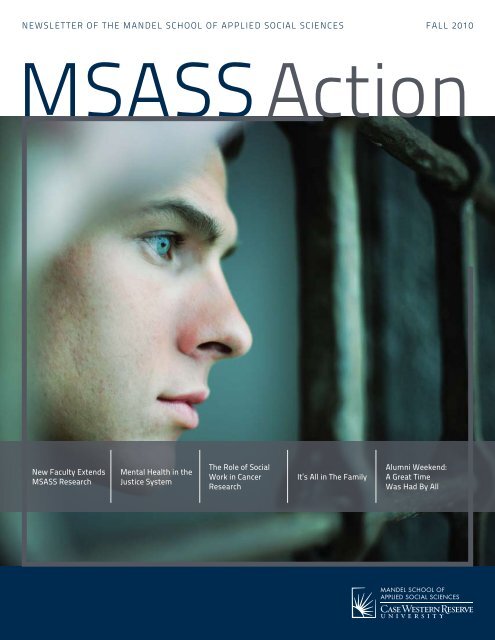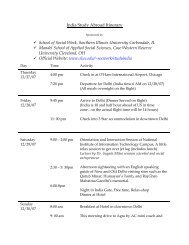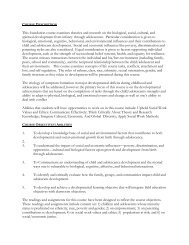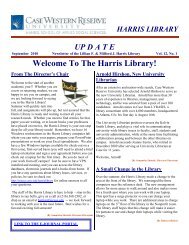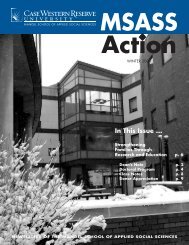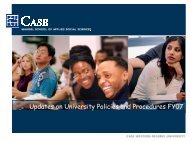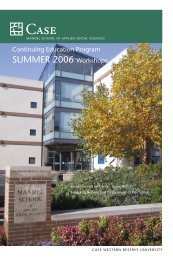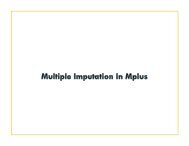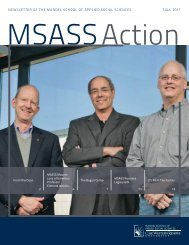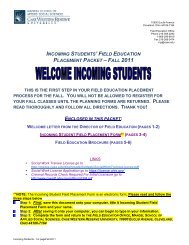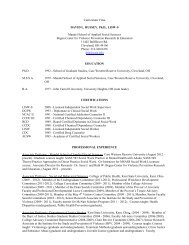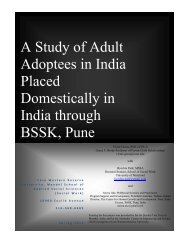Fall 2010 - Mandel School of Applied Social Sciences - Case ...
Fall 2010 - Mandel School of Applied Social Sciences - Case ...
Fall 2010 - Mandel School of Applied Social Sciences - Case ...
- No tags were found...
Create successful ePaper yourself
Turn your PDF publications into a flip-book with our unique Google optimized e-Paper software.
FACULTYNEWSAssistant pr<strong>of</strong>essorKathryn Betts Adamsorganized andpresented, along withcolleagues from theUniversity<strong>of</strong> Portland andUniversity <strong>of</strong> CentralFlorida, a “think tank”at the Council on <strong>Social</strong> Work Education(CSWE) Annual Program Meeting inPortland, OR, in October. The topic was“How to integrate Evidence-BasedPractice into practice Courses withoutlosing the focus on Practice or How tokeep the baby inwith the bathwater.”Pr<strong>of</strong>essors David E. Biegel and ElizabethM. Tracy are Co-Editors <strong>of</strong> the Evidence-Based Practices Series published byOxford University Press in cooperationwith the <strong>Mandel</strong> <strong>School</strong> <strong>of</strong> <strong>Applied</strong> <strong>Social</strong><strong>Sciences</strong>. The third volume in this Series,Mental Health Treatment for Childrenand Adolescents by Jacqueline Corcoran(2011), has just been published. Previousvolumes in the Series include <strong>School</strong><strong>Social</strong> Work by Michael Kelly, JamesRaines, Susan Stone, and Andy Frey(<strong>2010</strong>), and Family Psychoeducation forSerious Mental Illness by Harriet Lefley(2009). Six other volumes in the Seriesare under contract.The Cuyahoga CountyCommissionersappointed David E.Biegel, Henry ZuckerPr<strong>of</strong>essor <strong>of</strong> <strong>Social</strong>Work Practice andassociate dean forresearch and trainingat the <strong>Mandel</strong> <strong>School</strong><strong>of</strong> <strong>Applied</strong> <strong>Social</strong> <strong>Sciences</strong>, to the Alcohol,Drug Addiction and Mental HealthServices Board <strong>of</strong> Cuyahoga County. TheADAMHS Board is responsible for theplanning, funding and monitoring <strong>of</strong>public mental health and alcohol andother drug addiction services in thecounty. This is Dr. Biegel’s firstappointment. He is filling an unexpiredterm and is eligible for reappointment fortwo more four-year terms.Assistant pr<strong>of</strong>essors Mark G. Chupp andMark L. Joseph have published “Gettingthe Most Out <strong>of</strong> Service Learning:Maximizing Student, University andCommunity Impact” in the Journal <strong>of</strong>Community Practice, Taylor & FrancisGroup, LLC, 18:190–212, <strong>2010</strong>.Lillian F. HarrisPr<strong>of</strong>essor <strong>of</strong> UrbanResearch and <strong>Social</strong>Change Claudia J.Coulton was honoredas one <strong>of</strong> the <strong>Case</strong>Western ReserveUniversity <strong>2010</strong>Women <strong>of</strong>Achievement sponsored by the FloraStone Mather Center for Women.The final report <strong>of</strong> thePractice Review andImprovement Panelconvened by theCuyahoga CountyDepartment <strong>of</strong>Children and FamilyServices under theleadership <strong>of</strong>associate pr<strong>of</strong>essor David S. Cramptonwas released on October 13. Dr.Crampton and 27 child welfare expertsand community representativesincluding MSASS alumnae DaralynnConstant, MSSA ’76, Maureen Dee, MSSA’78, and Catherine Lester, ’99. The reportincluded 12 pages <strong>of</strong> recommendationsfor improving and enhancing services tocombat threats to children fromdomestic violence, substance abuse andmental illness. The panel called on theCuyahoga County’s child-welfare agencyto improve the way it manages highriskfamilies, but it also putresponsibility on the community andthe next county government to keepchildren safe. “It’s not about thedepartment…,” said Crampton, “It’sabout all <strong>of</strong> us working together toprotect our children.” The panel wasconvened after the deaths<strong>of</strong> two children who had been reunitedwith their parents. The report andrecommendations are available at:http://cfs.cuyahogacounty.us/en-US/community-task-forcerecommendations.aspxAssociate pr<strong>of</strong>essors Kathleen Farkasand Aloen Townsend have joined withMSASS doctoral alumna Amy Krentzmanto publish “Spirituality, Religiousness andAlcoholism Treatment Outcomes: AComparison between Black and WhiteParticipants. Alcoholism TreatmentQuarterly. 28, 2, p.128-150.Grace F. BrodyPr<strong>of</strong>essor <strong>of</strong> Parent-Child Studies VictorK. Groza has beengiven an honorarymembership to theAssociation <strong>of</strong> <strong>School</strong>s<strong>of</strong> <strong>Social</strong> Work inRomania for work hecontinued on page 4FALL <strong>2010</strong> 3
FACULTYNEWSdid in that country from 1991 to 2005.Dr. Groza has been working with theUniversity <strong>of</strong> Bucharest and otherinstitutions to develop social workeducation in Romania as well as severalother projects there.Dr. Groza was interviewed by the RuddAdoption Research Program at theUniversity <strong>of</strong> Massachusetts-Amherst“The Voices Project” in November abouthis research on national and internationalpolicy and practice including hisparticipation in Partners for ForeverFamilies, a Public-Private-UniversityInitiative and a Neighborhood-BasedApproach to recruitment, initiated in 2008and funded by Adoption Opportunities:Diligent Recruitment <strong>of</strong> Families forChildren in the Foster Care System. “At thetime this grant was developed,” stated Dr.Groza, “the overall population <strong>of</strong> children infoster care had declined but the childrenwho remained in care were older and morecomplicated, requiring new methods topromote their need for permanency.”Ralph S. and DorothyP. Schmitt Pr<strong>of</strong>essorMerl C. (“Terry”)Hokenstad, Jr. hasbeen chosen forappointment as aDistinguishedUniversity Pr<strong>of</strong>essorby President BarbaraSnyder at <strong>Case</strong> Western ReserveUniversity. Terry is in the first cohort <strong>of</strong>six CWRU pr<strong>of</strong>essors to receive thishonor. They were recognized at theUniversity Convocation in August.Dr. Hokenstad and MSASS doctoralstudent Amy Restorick Roberts recentlypublished “Global Greying and ActiveAging: Challenges for International <strong>Social</strong>Work” in the Journal <strong>of</strong> Global <strong>Social</strong>Work Practice, Vol. 3, No. 2 (November/December <strong>2010</strong>) and “<strong>Social</strong> Work’s Rolein Ensuring, Enabling and SupportiveEnvironments for Older Persons: A GlobalPerspective” in the Journal <strong>of</strong> <strong>Social</strong>Intervention: Theory and Practice, Vol. 19,Issue 2 (<strong>2010</strong>).4 MSASS ActionAt CSWE’s Annual Program Meeting inPortland, Dr. Hokenstad presented “<strong>Social</strong>Integration <strong>of</strong> Displaced Populations: The<strong>Case</strong> <strong>of</strong> Human Trafficking.” He alsopresented “The United Nations and ItsMillennium Development Goals” atKenyon College in November.Assistant pr<strong>of</strong>essorDeborah Jacobsonwill lead a panelpresentation onMicro-credit and<strong>Social</strong> Development inBangladesh: StudyAbroad Program atthe InternationalConsortium for <strong>Social</strong> Development(ICSD) conference in Dhaka, Bangladesh,January, 2011. ICSD is an organization <strong>of</strong>practitioners, scholars and students inhuman services. Seventeen studentsfrom CWRU on the study abroad coursein Bangladesh this year will each have achance to participate in the conferenceas part <strong>of</strong> the program.The CSWE Council onthe Role and Status <strong>of</strong>Women in <strong>Social</strong> WorkEducation MentorshipRecognition Programhas honored associatepr<strong>of</strong>essor Lenore A.Kola at the APMconference in Portlandin October. Dr. Kola was nominated byElizabeth M. Tracy, Ph.D. The honorrecognizes women “who have comebefore us” who provided crucial supportand guidance that leads to personal andpr<strong>of</strong>essional achievement and effectivepractice.Gerald Mahoney,Verna Houck MottoPr<strong>of</strong>essor <strong>of</strong> Familiesand Communities,gave the keynotepresentation for the9th Biannual NationalEarly ChildhoodIntervention AustraliaConference in Canberra, Australia in May.He and MSASS doctoral alumna FridaPerales, Ph.D. ‘09, alsopresented two, 2-dayworkshops on theResponsive TeachingEarly InterventionCurriculum for theWestern AustraliaDisability ServicesCommission in Perth,Australia. They also conducted an EarlyIntervention Institute at Chung YuanChristian University in Chung-Li, Taiwanin August and gave the keynotepresentation for the 4th InternationalConference on Special Education at ChungYuan Christian University in Chung-Li.Clinical instructorSoad Mansour visitedwith Japanese socialworkers in Tokyo,Japan on June 6th todiscuss MSASScurricula, admission,licensure requirements,and to promoterecruitment <strong>of</strong> students in the master’sprogram. Arrangement for the meetingwas made by MSASS alumna TomokoYamamura Thompson (MSSA ’96) whoworks at Tokyo Koseinenkin Hospital.Mansour met with five social workersrepresenting social work in hospitals, anNGO serving adults with disabilities, anda for pr<strong>of</strong>it recruitment firm. Dinnerfollowed with MSASS alumni: Tomokoand Steve (MSSA ’97) Thompson,associate pr<strong>of</strong>essor at YokohamaWomen’s Junior College; Keiko Kuwahara(MSSA ’03), translator coordinator; andAyaka Yamamato (MSSA ’00), teacher’sassistant for special education and NGOagency social worker.Newly appointedLeona Bevis/Marguerite HaynamPr<strong>of</strong>essor inCommunityDevelopment AnnaMaria Santiago waswelcomed byCleveland’s Hispaniccommunity in September at the MayDugan Center on Bridge Avenue. She
spoke briefly about her research in housing andmeasuring successful community change. Theevent was organized with the assistance <strong>of</strong>Lorraine Vega and Magda Gomez (MSSA ’04) <strong>of</strong>the Hispanic Roundtable and was attended byleaders in the for-pr<strong>of</strong>it and non-pr<strong>of</strong>it Latinocommunity.In <strong>2010</strong>, Dr. Santiago published an article withGeorge C. Galster, Ana H. Santiago-San Roman,Cristina M. Tucker, Angela A. Kaiser, and RebeccaA. Grace an article entitled “Foreclosing on theAmerican dream? The financial consequences <strong>of</strong>low-income homeownership.” Housing PolicyDebate, 20(4), 707–742.Emerita pr<strong>of</strong>essor IlgaSvechs will receive the “Cross<strong>of</strong> Merit” from her nativecountry <strong>of</strong> Latvia in aceremony scheduled forNovember 18 at the Library<strong>of</strong> Congress in Washington,DC. The Latvian “Cross <strong>of</strong>Merit” is the highest civilianaward given by Latvia. The award ceremonyincludes a dinner and concert attended by StateDepartment <strong>of</strong>ficials and representatives <strong>of</strong>Latvia. In 1992, Dr. Svechs returned as aFulbright Scholar to Latvia, the country she fledas a child during World War II, to become thefirst social work educator to go to the BalticStates following the fall <strong>of</strong> communism. Afterthat initial visit her return trips were continual.She taught in her native language at theUniversity <strong>of</strong> Latvia and at Latvia’s Academy <strong>of</strong>Culture. She also worked with the Latvianorphanages and lobbied relentlessly to establisha department <strong>of</strong> social work and psychology atthe Children’s Hospital <strong>of</strong> Latvia, the onlychildren’s hospital in the country. Her dreamwas realized in just three years. Exactly 75 yearsago, Dr. Svech’s father , John, received this sameaward for his loyalty and devotion to Latvia.In October, Elizabeth M.Tracy, Grace Longwell CoylePr<strong>of</strong>essor in <strong>Social</strong> Work,presented “Expanding theToolkit for Home BasedFamily Work: The Other 23Hours Then and Now” atthe Walker <strong>School</strong>Symposium at BabsonCollege in Wellesley, MA.INTERNATIONALSTUDY TRAVELThe <strong>Mandel</strong> <strong>School</strong> is <strong>of</strong>fering short-terminternational study opportunities for studentsand pr<strong>of</strong>essionals. As an alumni orpr<strong>of</strong>essional, you can join students as theytravel during spring break in March toGuatemala, Turkey, Kenya, or to Ecuador inMay. Travelers see cultural attractions as wellas meet with regional and neighborhoodleaders, policymakers, practitioners, scholarsand consumers. These internationalopportunities are designed to enableparticipants to experience a new culture, tosee comparative social service systems, and togain new insights into the needs <strong>of</strong> people inthe U.S. and abroad. Recent studies haveshown participants who are immersed inshort-term travel programs to be moreglobally engaged. For more information, youcan visit our web site at http://msass.case.edu/international/index.html or contactDr. Debby Jacobson at dxj@ase.eduFALL <strong>2010</strong> 5
News from the Doctoral ProgramCurrent StudentsPatrick BoyleZoe Breen WoodHeehyul MoonFelicia Demchuk6 MSASS ActionPatrick Boyle (2001 Cohort)has made several presentations in The Netherlands:“Integrated Treatment Principles,” AvansHogeschool, University <strong>of</strong> <strong>Applied</strong> <strong>Sciences</strong>,videoconference, Breda, NL September 2, <strong>2010</strong>“Integrated Treatment: Principles, Challenges, andLessons Learned,” GGZ Breburg Group, Breda, NL.March 9, <strong>2010</strong>“Integrated Dual Disorder Treatment: 10 Years<strong>of</strong> Lessons Learned,” Mentrum program leadermaster class, Mentrum/Arkin, Amsterdam, NL.March 9, <strong>2010</strong>,Zoe Breen Wood (2003 Cohort)traveled to Guatemala for a travel and studytour with students, where they provided trainingand technical assistance to child welfare serviceproviders in March <strong>2010</strong>. She also traveled toEthiopia to provide training and technicalassistance to community-based and governmentagencies related to child welfare and adoption inMay <strong>2010</strong>.Heehyul Moon (2006 Cohort)is focusing her dissertation on potentialpredictors <strong>of</strong> quality <strong>of</strong> life <strong>of</strong> family caregivers(CG) and care recipients (CR) with dementia at theearly stage. This study assesses incongruencebetween CG and CR about the CR’s values andpreferences about the decision making processand decision making involvement. In addition,this research explores the mediating effect <strong>of</strong>CG’s and CR’s negative perceptions <strong>of</strong> the quality<strong>of</strong> the relationship between CG and CR, and onthe association between incongruence in thedecision making process and quality <strong>of</strong> life <strong>of</strong>both CG and CR.Felicia Demchuk (2006 Cohort)presented in Rolduc, Kerkrade, the Netherlands forthe first European Conference on Fetal AlcoholSpectrum Disorders, November 3 – 5, <strong>2010</strong>. Shegave a poster presentation based on her doctoralstudy entitled “Investigating the impact <strong>of</strong> prenatalalcohol exposure on the social-emotional, academic,and adaptive functioning <strong>of</strong> internationally adoptedchildren” including detailed information about theliterature review. Felicia reports, “I was honored tobe able to present my study; however, the mostvaluable part <strong>of</strong> this experience was that I was ableto meet with a number <strong>of</strong> the researchers uponwhose work my own study is based. As a result Ireceived first-hand information about theircurrent and unpublished work while having theopportunity to network with the top scientists inmy field. Though this was intimidating at times, Ifelt that my pr<strong>of</strong>essors and experiences at MSASShad prepared me well as I interacted with theseworld-class researchers.”Maureen Riley Behringer(2009 Cohort)provided a one-hourpresentation at a conference inOslo, Norway in May entitled“Orphaned and VulnerableChildren in Low ResourceCountries:A Summary <strong>of</strong> Education Interventions.”International Adoption Conference: InternationalAdoptees — <strong>School</strong> performance, educationattainment, and social adjustment. Held in Oslo,Norway; May 18-19; 2009Louis Weigele (2009 Cohort)conducted a training sessionwith Richard Romaniuk (MSSA’99) in October <strong>2010</strong> ontreatment and prevention <strong>of</strong>problem and pathologicalgambling in Warsaw, Poland.Approximately one hundredtherapists and addiction specialists fromthroughout Poland participated in the training. Asthe result <strong>of</strong> increased availability andaccessibility to gambling opportunities due to anincrease in video lottery terminals and casinos,there was an identified need for gambling specifictraining. Both Richard and Louis teach addictionsrelatedcoursework at MSASS. Louis also is acertified problem gambling counselor who haspresented regionally and nationally on problemsrelated to gambling. The training was sponsoredby the Polish national lottery and a Polishfoundation.
Doctoral Alumni in the NewsSandra M. Turner, Ph.D. ’04, was namedone <strong>of</strong> three overall America’s Area ValuesChampions for Ernst & Young LLP. She isthe U.S. Director <strong>of</strong> the company’s AssistProgram and is responsible for delivering arange <strong>of</strong> services including personal andfamily counseling, daily life services, legalconsultation, the E&Y discounts program,back-up care and college coaching to the Ernst & Young family.Dr. Turner was given this honor in September at a dinner inNew York City.David A. Campbell, Ph.D. ’00, has published “Is constituentfeedback living up to its promise? Provider perceptions <strong>of</strong>feedback practices in nonpr<strong>of</strong>it human service organizations”in Families in Society (<strong>2010</strong>) (91) 3, pp. 313-320. David isassistant pr<strong>of</strong>essor at Binghamton University in New York.Martha G. Roditti, Ph.D. ‘03, has joined P. Schultz, M. Gillette,M. and I. de la Rosa in the publication <strong>of</strong> “ Resiliency and socialsupport networks in a population <strong>of</strong> Mexican Americanintimate partner violence survivors” in Families in Society,(<strong>2010</strong>) (91) 3, pp. 248-256.Craig Boitel, Ph.D. ’02, MSSA ’77, hascollaborated with his wife LaurentineFramm, M.D. and Kathleen J. Farkas, Ph.D.and Merl C. “Terry” Hokenstad, Jr., Ph.D. inthe publication <strong>of</strong> “ Learning transferprinciples in a comprehensive integrationmodel” in the Journal <strong>of</strong> Teaching in <strong>Social</strong>Work. (November 2009) 29(4), 400-417.MSASS CAREER SERVICES:Not Just for Students AnymoreThe <strong>Mandel</strong> <strong>School</strong> <strong>of</strong> <strong>Applied</strong> <strong>Social</strong> <strong>Sciences</strong> in collaboration with the University’s Career Center provides graduates careerassistance, job exploration and other related resources. These services are provided through one-on-one consultation, careercounseling, self-assessments, mock interview services and access to CareerLink. Career Workshops enable alumni and studentsto focus on self-awareness techniques and skills. Alumni may contact Thomas Matthews, Director <strong>of</strong> the Career Center, by emailthomas.matthews@case.edu, or at 216-368-4446 to learn more about or request specific workshops.Don’t forget that MSASS has alumni and faculty with extensive knowledge <strong>of</strong> employment trends in the field on a local, regional,national and international level. Graduates <strong>of</strong> The <strong>Mandel</strong> <strong>School</strong> are located in all 50 states and 36 countries and are employed inall sectors <strong>of</strong> social work practice. Alumni and students may contact Pamela Carson, Director <strong>of</strong> Alumni Relations, by emailpamela.carson@case.edu or at 216-368-2281 for individualized support and networking opportunities with alumni. Faculty canalso be <strong>of</strong> great assistance when discussing your career aspirations or opportunities. Faculty websites and email addresses arelocated at http://msass.case.edu/ For more information regarding Career Services at MSASS, please contact 216-368-6756.FALL <strong>2010</strong> 7
NEW FACULTY EXTENDSMSASS ResearchBuilding Assets in Low-Income CommunitiesAnna Maria Santiago, Ph.D., joined the faculty at the <strong>Mandel</strong> <strong>School</strong> <strong>of</strong> <strong>Applied</strong><strong>Social</strong> <strong>Sciences</strong> in July <strong>2010</strong> as the inaugural Leona Bevis and MargueriteHaynam Pr<strong>of</strong>essor in Community Development. Dr. Santiago is a specialist inurban and social welfare policy as well as research methodology. She has held facultypositions at the University <strong>of</strong> Puerto Rico-Mayaguez, Universidad del SagradoCorazon, Seton Hall University, Indiana University, and Wayne State University. Sheteaches research, community and social development, and policy courses in themaster’s and doctoral degree programs at the <strong>Mandel</strong> <strong>School</strong>.For more than two decades, Dr. Santiago has been involvedwith research that examines the importance <strong>of</strong> place on theeconomic opportunities and life chances <strong>of</strong> low-income andminority families. Dr. Santiago’s current research focusesprimarily on how federal, state and local housing policies andprograms serve as vehicles for community and socialdevelopment. The four domains <strong>of</strong> her current work are (1) theimpacts <strong>of</strong> housing markets on low-income, minoritycommunities and individuals; (2) human, financial and socialcapital formation and asset building strategies in low-incomefamilies; (3) evaluating the multidimensional value <strong>of</strong>homeownership to low-income households; and (4) measuringneighborhood effects on the health and well-being <strong>of</strong> lowincome,minority children. In each <strong>of</strong> these areas, she isconcerned with identifying the ways in which contemporarysocial welfare and anti-poverty policies can be used to reducethe social and economic disparities experienced by low-incomeand minority families and children residing in U.S. urban areas.Her publications include numerous articles in peer-reviewedjournals, book chapters, and one co-authored book, Why NOT inMy Backyard?Dr. Santiago’s research has been supported by grants from theU.S. Department <strong>of</strong> Housing and Urban Development, theNational Institute <strong>of</strong> Child Health and Human Development, theFord Foundation, the Mac Arthur Foundation, the <strong>Social</strong> ScienceResearch Foundation, and the W.K. Kellogg Foundation.Currently, she is working on two grant-supported projects: NotJust Buying a Home, a longitudinal study funded by the Fordand Mac Arthur Foundations which evaluates the short- andlonger-term impact <strong>of</strong> homeownership counseling programson social capital formation for low-income, minority8 MSASS Action
homebuyers. For the past ten years, this studyhas followed two cohorts <strong>of</strong> low-incomehouseholds receiving housing assistance toascertain how they can be best assisted to buildfinancial, human and social capital and attain andmaintain homeownership. The study uses datafrom an innovative self-sufficiency/asset buildingand homeownership program (HOP) run by theDenver Housing Authority. Goals <strong>of</strong> the projectinclude unbiased estimates <strong>of</strong> HOP programimpacts for achieving homeownership andownership <strong>of</strong> other assets and impacts <strong>of</strong>homeownership on adult and child outcomes;benefit-cost analysis <strong>of</strong> HOP; and an analysis <strong>of</strong>home appreciation and foreclosure experiences <strong>of</strong>low-income homeowners. The primary goals <strong>of</strong> the study areto rigorously evaluate the multi-dimensional value <strong>of</strong>homeownership to low-income households and the efficacy <strong>of</strong>an innovative program to increase such homeownershipopportunities.The second study, Magnitudes and Mechanisms <strong>of</strong>Neighborhood Effects on Children, was funded by grants fromthe National Institute <strong>of</strong> Child Health and HumanDevelopment, the W.K. Kellogg Foundation and the MacArthur Foundation, examines the influence <strong>of</strong> neighborhoodcontexts on the health and well-being <strong>of</strong> children throughoutchildhood. The purpose <strong>of</strong> this study is to: (1) quantifyprecisely how various conditions in the surroundingneighborhood independently affect a variety <strong>of</strong> outcomes forlow-income children who have resided in public housing for asubstantial period <strong>of</strong> time during childhood; and (2) probecausal paths and mechanisms relative to how neighborhoodconditions or environments might cause these outcomes. Theresearch poses several questions. For children who spend aconsiderable period during ages 0-18 living in DHA publichousing, are there statistically and economically significantdifferences in their outcomes in five domains (health,education, employment, behavioral and demographic) thatcan be attributed to differences in their neighborhoods(controlling for family and individual characteristics)? If thereare neighborhood-based differences in child outcomes, whatappear to be the salient mechanisms and causal pathsoperative in the neighborhood environment? Do thesemechanisms and paths vary by outcome domain,neighborhood spatial scale, and child developmental stage,ethnicity or gender?In both studies, the goal <strong>of</strong> the analyses is to aid in thedevelopment <strong>of</strong> more effective antipoverty policies andprograms to improve the opportunities and life chancesavailable to low-income and minority families and theirchildren.FALL <strong>2010</strong> 9
Mental Health in theJustice SystemAmy Blank Wilson is an assistantpr<strong>of</strong>essor at MSASS and recentlycompleted a National Institute <strong>of</strong> MentalHealth postdoctoral fellowship at theInstitute for Health, Health Care Policy,and Aging Research at Rutgers University.Dr. Wilson joined MSASS in July and isteaching Direct Practice classes thissemester. She has received extensivetraining in both quantitative andqualitative research methods and has worked on numerousprojects examining mental health services using thesemethods. Her dissertation used ethnographic researchmethods to examine how people with mental illness accessservices after release from jail. During her postdoctoral training,she examined the experiences <strong>of</strong> people with mental illnessesin jail using Medicaid claims and jail data. Her dissertationresearch raised a number <strong>of</strong> questions about the paritybetween the services available in the public mental healthsystem and those available to people with mental illnessinvolved in the criminal justice system and the barriers theseindividuals face when trying to access services upon release.Since completing her doctorate degree, Dr. Wilson has receivedfunding from the Leonard Davis Institute <strong>of</strong> Health Economicsand the National Institute <strong>of</strong> Disability and RehabilitationResearch to explore the community participation <strong>of</strong> peoplewith serious mental illness leaving jail and the public mentalhealth system’s capacity to provide services to theseindividuals. There are several areas related to service deliverysystems and people who are either incarcerated or homelessthat she would like to pursue to build upon her earlier research.One critical area involves the identification requirements <strong>of</strong>health and mental health services. Her study would examinethe expanded use <strong>of</strong> identification requirements in health andmental health care services and how these requirementsimpact people with serious mental illnesses and their access toservices, especially among those who are homeless or involvedin the criminal justice system.Dr. Wilson would also like to take the study further by testingthe feasibility <strong>of</strong> using observation research techniques to studyhow people with mental illness engage community resourcesand participate in community activities after release from jail.One aspect <strong>of</strong> this study would examine where this participationtakes place in relation to where individuals live. Because there istypically no “exit plan” for parolees, Dr. Wilson would compareand contrast how people with mental illness define their ownservice needs when they are released from jail and what kinds<strong>of</strong> strategies they use to meet these needs. These would thenbe compared with the goals and service strategies thatpr<strong>of</strong>essionals who work with these individuals might develop.10 MSASS Action
The Role <strong>of</strong> <strong>Social</strong> Work inCancer ResearchJung-won Lim is an assistant pr<strong>of</strong>essor at MSASS and a member <strong>of</strong> theBuilding End-<strong>of</strong>-life Science through Positive Human Strengths and Traits(BEST) Center <strong>of</strong> the CWRU Frances Payne Bolton <strong>School</strong> <strong>of</strong> Nursing. Shereceived her Ph.D. in <strong>Social</strong> Work from the University <strong>of</strong> Southern California in2006, and joined the MSASS faculty in July.Dr. Lim’s earlier positions include medical social worker in theHangang Sacred Heart Hospital, Seoul, Korea, and researchfellow in the Center <strong>of</strong> Community Alliance for Research andEducation (CCARE) at the City <strong>of</strong> Hope National Medical Center,Duarte, California. Her major research focus involves cancersurvivorship and caregiving issues for cultural and ethnicminority and underserved populations. She has a specialinterest in psychosocial and behavioral outcomes with the goal<strong>of</strong> improving overall quality <strong>of</strong> life and reducing cultural andethnic disparities among underserved Asian-American cancersurvivors and their family members.As an ethnic minority woman (Korean) living in the UnitedStates, Dr. Lim came to recognize the salience <strong>of</strong> culture in herown life, as well as the psychosocial and socioecologicalcontexts among diverse ethnic populations. She arrived in theUnited States in 2001 to begin her academic and researchcareer at the University <strong>of</strong> Southern California (USC). Beforecoming to the United States, she worked as a medical socialworker, providing patients with diverse psychosocial andfinancial services for three years. While working as a socialworker, Dr. Lim recognized the need for a pr<strong>of</strong>essional andsystemic approach to working with patients and decided topursue further study in United States. Her initial focus was onpatients with chronic physical illness (not specific to cancersurvivors), but a calling to psychosocial oncology plunged herinto a lifetime commitment to the field as a research scientist.In 2009, Dr. Lim, as principal investigator, submitted a proposalto the National Institutes <strong>of</strong> Health/National Cancer Instituteto examine family communication and coping among KoreanandChinese-American breast cancer survivors and theirfamilies. The proposal was funded at its first submission. Thegoal <strong>of</strong> the project is to better understand whether and in whatways talking about a traumatic event may help Asian-American cancer survivors make sense <strong>of</strong> the experience, findmeaning, and achieve emotional resolution. The specific aim <strong>of</strong>this study is to investigate the patterns in familycommunication, coping, and health-related quality <strong>of</strong> life(HRQOL) between Chinese- and Korean-American breastcancer survivors, and to explore dyadic relationships in familycommunication and coping between the survivors and familymembers using a culturally responsive framework. This studywill benefit future research on the development <strong>of</strong> familycommunication and family coping models for Chinese- andKorean-American breast cancer survivors and their families. Itwill also demonstrate the applicability and efficacy <strong>of</strong> theculturally-tailored models, and develop the evidence-basedintervention programs that will improve health-related quality<strong>of</strong> life.Currently, Dr. Lim is engaged in a pilot study with the FrancesPayne Bolton <strong>School</strong> <strong>of</strong> Nursing to expand her studies <strong>of</strong>partner communication for women with breast cancer, menwith prostate cancer, and men and women with colorectalcancer on the purpose <strong>of</strong> improving family resilience andquality <strong>of</strong> life. These survivors and their partners will includeAsian-, African-, and European-Americans.Dr. Lim says, “These projects help me to establish my career asan independent scientist in the psychosocial and behavioralcancer research arena, and, in turn, diversify the pool <strong>of</strong>researchers who are committed to understanding andaddressing the needs <strong>of</strong> Asian Americans cancer survivors.”FALL <strong>2010</strong> 11
IT’S ALL IN THEFAMILYLove in 320AWhen Ryan Mosier (MSSA ’07) left Indiana University,he chose a graduate program in social work that wouldbe close to his family home in Chardon, Ohio. MSASS washis first choice to pursue an education in child therapy.At the same time Jennifer Nye (MSSA ’07) was moving fromIndianapolis to Cleveland to attend MSASS and would alsostudy child therapy. Jennie said two factors made herdecision: MSASS’top-ten nationalranking and theavailability <strong>of</strong>scholarships. Ryanand Jennie met inJerry Strom’s ChildDevelopment classand by the end <strong>of</strong>their first semester,they had honedtheir listening skillsas much on eachother as on theclass. Graduatingin 2007, the twoembarked oncareers: Ryan infull-time privatepractice, atAffiliates inBehavioral Health, and as apart-time child therapist at Beech Brook; and Jennie at <strong>Case</strong>Western Reserve University’s Weatherhead <strong>School</strong> <strong>of</strong>Management as director <strong>of</strong> its annual fund.Ryan Mosier and Jennifer NyeTheir relationship continued to blossom for another twoyears after graduation when Ryan thought it might be timeto advance it to the next level. In February 2009, he askedJennie to meet him in Room 320A at MSASS to participatewith him on a career panel. Just another activity to fit intoher busy life she thought. She arrived to an empty room,except for Ryan, who told her that he was glad she was“early” since it gave him time to show her his PowerPointpresentation. As a skilled presenter, Ryan’s PowerPointincluded bullet points, photos, and clever graphics to conveyhis message <strong>of</strong> love. Half way through the presentation,Ryan was becoming frustrated. Jennie simply wasn’tgetting it despite slides that were framed in little hearts.The last slide entitled “In Summary” was when Ryanpopped the question and produced an engagement ring.The rest, as they say, is history. We hope their’s will be alifetime <strong>of</strong> happiness that began at MSASS.A Tradition <strong>of</strong> LeadershipLike the Barrymore’s, some families are rich with passion,talent, and distinguished careers within the same field.Such was the path for four members <strong>of</strong> the Schlachterfamily in the practice <strong>of</strong> mental health serving children andfamilies. William (Bill) Schlachter grew up in the Bronx inNew York City with his younger brother Roy. Bill went <strong>of</strong>f toSASS and graduated in 1952. Before following in his olderbrother’s footsteps, younger brother Roy married LillianGlassberg, another New Yorker with the goal <strong>of</strong> becoming achild and family therapist. The couple went <strong>of</strong>f to Cleveland,and Roy graduated from SASS in 1959. Lillian waited untiltheir three children were <strong>of</strong> school age, and then she beganclasses at SASS, graduating in 1976. Their eldest child, Scott,followed in their footsteps, graduating in 1984.Bill Schlachter died in 2006 after a notable career in thepublic sector as director <strong>of</strong> child welfare for MontgomeryCounty, Pennsylvania. Roy worked at Cleveland PsychiatricInstitute and Hospital and at Youth Services before going toMetro General Hospital to establish an evening mentalhealth clinic. Healso counseledwomen comingout <strong>of</strong> prison inthe newly-createdCommunityRe-Entry Programat LutheranMetropolitanMinistry andenjoyed a longstint as the call-incounselor onTV-5’s “TheMorningExchange.”Lillian earned aB.A. degree inPsychology fromQueens Collegein New York andworked for JewishVocational Service,so entered SASS with yearsRoy, Lillian and Scott Schlachter with Indie<strong>of</strong> experience. She also entered the mental health field aftergraduation, first for Sagamore Hills Children PsychiatricHospital, then Lake County Mental Health Center and laterin private practice. During this time Lillian also served asadjunct faculty at MSASS for 12 years and taught numerouscontinued on page 1412 MSASS Action
[ Class Notes ]Verna Houck Motto, MSSA ’42, celebratedher 91st birthday recently. She alsomoved eastward to Haverford nearPhiladelphia be near her daughterMarilyn and family. Her only regret wasthat she could not take the Californiaweather with her.Edith Holzbauer Kalech, MSSA ’53,continues in the helping pr<strong>of</strong>essionthrough retirement. She is a docent at aHolocaust Museum in Cherry Hill, NJ. Shealso volunteers in her community visitingthe sick, providing care taker relief anddriving seniors to appointments.Howard Epstein,MSSA ’57, authored,Jews in Small Towns:Legends & Legacies.An Atlanta PBSstation close to hishometown <strong>of</strong>Decatur, GA did avideo interview withhim about the book.Both the book andthe video have been placed in the library<strong>of</strong> the new Museum <strong>of</strong> American Jews inPhiladelphia.Virginia Galbreath Gibson, MSSA ’69,has written a historical fiction book forchildren based on the life <strong>of</strong> her greatgrandfather. Titled “Escape on theNational Road” it is currently beingillustrated and should be published soon.Dorothy <strong>Fall</strong>er, MSSA ’75, has beenelected President <strong>of</strong> the Board <strong>of</strong> theGestalt Institute <strong>of</strong> Cleveland.Monica Meade, MSSA ’82, has been aschool social worker in Texas for over 16years. In 2009 she was named Texas<strong>School</strong> <strong>Social</strong> Worker <strong>of</strong> the Year.Alease Johnson, MSSA ’82, is AssistantDirector <strong>of</strong> <strong>Social</strong> Work at SuburbanHospital, Johns Hopkins Medicine.Patricia Nobili, MSSA ‘86, has held thepost <strong>of</strong> President and Executive Director<strong>of</strong> the Achievement Centers for Childrenfor 16 years. In that time the agency hasgrown five times over, serving 4,000children with disabilities and theirfamilies in three locations in CuyahogaCounty.Carole Brazsky, MSSA ’91, is retired aftera career working in mental health, withthe criminally insane and as theexecutive director <strong>of</strong> Child Abuse Arizona.Laura Arabian, MSSA ’93, completed theCleveland Rite Aide Marathon.continued on page 14Photo by Daniel MilnerAs proud MSASS alumna JaneDar<strong>of</strong>f MSSA ’85, (third from right)looked on, an energetic crowd <strong>of</strong>students and community memberscelebrated the new <strong>Case</strong> WesternReserve University Lesbian GayBisexual Transgender Center with aformal ribbon-cutting ceremony.Dar<strong>of</strong>f, co-founder <strong>of</strong> ClevelandPFLAG, an organization for parents,family and friends <strong>of</strong> lesbians andgays, was a driving force in thedevelopment <strong>of</strong> a center on the<strong>Case</strong> campus. The new space is inthe southwest corner <strong>of</strong> the firstfloor <strong>of</strong> Thwing Center.Stephen Smookler, MSSA ’70, is executivedirector <strong>of</strong> Wesley Community Servicesin Cincinnati, OH. His agency providesservices for seniors, including homemakerservices, Meals-on-Wheels, medicaltransportation, housing and links to aconsortium <strong>of</strong> churches serving seniors.The agency also has a meals and careprogram for the pets who live withseniors.Merrianne Moss Leff, MSSA ’73, is inprivate practice in High Point NC. She isboard member with the local NAMI.Distinguished Alumni Lecture“How to Use Storytelling & Its Benefits in a <strong>Social</strong> Service Client Setting”Friday, February 18, 2011 - 2:00 to 4:00 p.m. <strong>Mandel</strong> <strong>School</strong>, Room 320Barbara Eady, MSSA ‘74 (2 CEU’s)Storytelling is <strong>of</strong>ten used for entertainment, education and edification andcan be a powerful therapeutic tool. It gently opens the heart and mind to newinsights and, teaching others to share stories, can allow your clients to findtheir own voice. You will be invited to listen as well as plan ways to addstories in treatment. Contact Pamela Carson at 216-368-2281 orpamela.carson@case.eduCEU’s are $25 per lecture payable at the door.FALL <strong>2010</strong> 13
[ Class Notes ]14 MSASS ActionKaren J. Osterle,MSSA ’94, wasnamed a “TopTherapist” byWashingtonMagazine. She isalso included inWho’s Who inMedicine Academia,2008.Anna “Lisa” Clark, MSSA ’95, is withBerea Children’s Home and FamilyServices as Director <strong>of</strong> ResidentialTreatment, Group Homes and PartialHospitalization.Erin Martin, MSSA ’02, is a contractor forthe Department <strong>of</strong> Defense and istraveling to military instillations in theUS and abroad, working with soldiers andtheir families around issues <strong>of</strong>deployment and reintegration fromcombat zones.Corey Miller, MSSA ’05, is a United StatesProbation Officer for the Eastern District<strong>of</strong> Tennessee in their Investigation Unit.Katherine Pecorak Goodman, MSSA ’05,had twin boys last year. She is a socialworker at Menorah Park in the rehabunit.Monica Bricker-Thompson, MSSA ’08,works for United Way Services <strong>of</strong> GeaugaCounty coordinating the emergencyfinancial assistance program. She andher husband Jason are licensed fosterparents/adoptive parents for PortageCounty Job and Family Services.Tamore Gemayel, MSSA ’08, is theCommunity Relations Coordinator forLakeland Management Systems, Inc.MSASS Women <strong>of</strong> AchievementIT’S ALL IN THE FAMILY continued from page 12continuing education classes until her“real” retirement in 2005. Scottgraduated from The Ohio State Universitywith a social work degree and took thefamily path to SASS. His field educationmemories include the VeteransAdministration and Portage Path, amental health care agency in Barberton,Ohio. Today, Scott divides his daysbetween a private practice working withadolescents and families in Beachwood,Ohio and Grand River Academy where hecounsels high school boys.Although all the Schlachters enjoyedclasses in Beaumont Hall, their journeyat SASS took place during different erasin social history as well as pr<strong>of</strong>essionalsocial work education. Lillian remembersWilma Peebles Wilkins, MSSA ’71, was honored withthe “Alumni Achievement Award” from the <strong>School</strong> <strong>of</strong>Education at the University <strong>of</strong> North Carolina at ChapelHill. Dr. Peebles-Wilkins earned her Ph.D from UNC.She was Dean <strong>of</strong> the Boston University <strong>School</strong> <strong>of</strong><strong>Social</strong> Work for twelve years until her retirement.Phyllis Brody, MSSA ’58, Co-founder <strong>of</strong> Creativity forKids was recognized by Crain’s Cleveland Businessas a distinguished female business leader. She and abusiness partner began Creativity for Kids out <strong>of</strong> herbasement in 1976. Brody has remained a leader inthe educational toy industry, winning such honors asthe Oppenheim Best Toy Award and the Parents’Choice Award.Volunteer OpportunityMSASS alumni are invited to volunteer to assist students during a job developmentevening: Preparing for your Career in <strong>Social</strong> Work, on Thursday, January 20, 2011 from5:30 to 8:00 p.m. at the <strong>School</strong>. Volunteers are needed to conduct mock interviews.For more information or to volunteer, call Michael Holub, MSSA ’96 at 216-368-6165.how different it was for her as an olderstudent entering graduate school andone who was unafraid to challenge orquestion prevailing theory. Royremembers when the CWRU campusshut down because folksinger PeteSeeger was coming for a concert. Scottreflects on some <strong>of</strong> the risks in havingthe same pr<strong>of</strong>essors as your parentshad years before. But as individuals wh<strong>of</strong>ollowed the same path into mentalhealth social work, they value theeducation they received and theopportunities their MSSA degree<strong>of</strong>fered them throughout their careers.Do members <strong>of</strong> your family share anSASS/MSASS connection? Contact AnneMarie Cronin at axc34@case.edu.
Alumni Weekend –A Great Time Was Had By All(l-r) Susan Ross, ‘10, Jennifer Nye, ‘07, Estella Anku-Kidd, ‘10 and Lori Van Arsdell,Deana Jackson, Mindy Ghaemaghamy, ‘09Joan Southgate, MSSA ‘54and Dean GilmoreJane Miller, MSSA ’90MSASS alumni came together in strong numbers for thecampus-wide <strong>Case</strong> Western Reserve University AlumniWeekend from September 30 through October 3. MSASSkicked <strong>of</strong>f its events with a reception on Thursday eveninghosted by Dean Cleve Gilmore that drew alumni from acrossthe years for food, drink and great discussion. Friday startedout with the “Grand Classes Luncheon” where JoanSouthgate, MSSA ’54 and this year’s MSASS DistinguishedAlumna, was honored along with alumni award winnersfrom throughout the University. Later in the afternoon,MSASS associate pr<strong>of</strong>essor David Crampton, joined threeother University faculty for a panel discussion on “ThePolitics <strong>of</strong> Finance.” While the Weatherhead Business<strong>School</strong> faculty discussed finance through the eyes <strong>of</strong> theglobal economy and Washington DC politics, Dr. Cramptonstayed closer to home talking about housing prices, schoollevies and human service issues. On Saturday afternoonnearly 60 alumni and friends gathered at MSASS for alecture by Jane Miller, MSSA ’90, on “Training AssistanceDogs for Mental Health-The New Frontier.”(l-r) Lillian Schlachter, MSSA ’76 and Roy Schlachter,MSSA ’59 talk with Hal Agrast, MSSA ’51”Andrea Porter, ‘79, and Brandon Johnson, ‘11Misty Funk, MSSA ‘10 with Hal Agrast, MSSA ‘51and wife Charlotte.Join the fun and mark your calendars now for Alumni Reunion Weekend 2011, October 13 through the 16th.FALL <strong>2010</strong> 15
We RememberWith sadness, the <strong>Mandel</strong> <strong>School</strong> <strong>of</strong> <strong>Applied</strong><strong>Social</strong> <strong>Sciences</strong> announces the passing <strong>of</strong> ourextraordinary alumni and extends heartfeltcondolences to their family and friends:Florence E. TupperFlorence Evelyn Tupper, MSSA ’49 passed away at 100 yearsyoung in Alexandria, VA in October. Ms. Tupper was NationalDirector <strong>of</strong> Hospital Service for the Red Cross in Washington, DC.In 1943 she joined the Red Cross and rose through the ranksuntil retirement in 1974. Her career covered post-WWII and theKorean and Vietnam Wars. She directed Red Cross hospitalprograms in Korea, Japan, Okinawa, the Philippines, Guam,Hawaii, South Vietnam and Thailand.Combining her pr<strong>of</strong>essional background and her interest inyoung people, Ms. Tupper was a group leader in the AmericanRed Cross hospitality project called Operation Vista, forstudents from other countries. She kept in touch with severalteenagers from various countries and was most proud that herKorean student, Ban Ki-moon, rose through the diplomaticranks to become Secretary General <strong>of</strong> the United Nations in2007. They had a life-long friendship. They had a joyous reunionin 2007 after Mr. Ban moved to New York and the UnitedNations and again in 2009 when he attended a celebration <strong>of</strong>her 100th birthday.David H. Apple, ADL’33, SAS’40Helen Lampe, FSM’32, SAS’38Virginia Mary Sullivan, SAS’40Harold Needle, SAS’41Josephine V. Turner, SAS’44Michiko U. Higa, SAS’46Pauline E. Palub, SAS’46Elizabeth Turner, SAS’46Yvette R. Arian, SAS’49Lucy B. Fried, SAS’49Ruth Herman, SAS’49Robert L. Runkle, Jr., SAS’54Joan T. Rea, SAS’55George Mousetis, SAS’56Kathryn Gottschalk, SAS’57Cyril M. Misenko, SAS’61Gilbert E. Marsh, SAS’67Sheila D. Harshaw, SAS’68Mary M. Heenan, SAS’72Alma Reuben, SAS’73Rhonda Speert Grossman, SAS’77Florence Wish, SAS’77Martin P. Garino, Ph.D., SAS’77, GRS’77Virginia Ann Frohwerk, SAS’83Marcia Williams LaRiche, SAS’85Andrea Gemayel, SAS ‘86Kathryn Ann Vickey, SAS’87Miriam Stayerman Kline, SAS’89Dave Russell Newman, SAS’90Tonya Hunter, SAS’95Stephen Kruger, SAS’96, MGT’96Lisa Catherine Clay, SAS’0316 MSASS Action
Celebrating 10 years <strong>of</strong> evidence-based practices in Ohioanticipating the integration <strong>of</strong> primary and behavioral healthcareby Paul M. KubekThis season marks the tenth anniversary <strong>of</strong>the State <strong>of</strong> Ohio’s investment in evidencebasedpractices in local communities for thetreatment and recovery <strong>of</strong> people withsevere mental illness (SMI). The anniversarywas celebrated by the <strong>Mandel</strong> <strong>School</strong>’sCenter for Evidence-Based Practices (CEBP)at its EBP conference, titled “SustainingEvidence-Based Practices: The Next TenYears,” which took place on October 12, 13,and 14 at the Greater Columbus ConventionCenter. Over 330 people from Ohio and 17other states attended the event, whichfeatured over 60 workshops and threekeynote plenary sessions.This year’s conference was the ninthsponsored by the CEBP and its CoordinatingCenter <strong>of</strong> Excellence (CCOE) initiatives. Theevent also marked the tenth anniversary <strong>of</strong>the CEBP, which is a technical assistanceorganization that provides consultation,training, and evaluation to service systemsand organizations that implement thesepractices. The CEBP is co-directed by LenoreA. Kola, Ph.D., <strong>of</strong> the <strong>Mandel</strong> <strong>School</strong> andRobert J. Ronis, M.D., <strong>of</strong> the Department <strong>of</strong>Psychiatry at the <strong>Case</strong> <strong>School</strong> <strong>of</strong> Medicine.From Pilot Sites to Sustainable ProgramsThe CEBP got its start in December 1999 when the Ohio Department <strong>of</strong> Mental Health (ODMH) invested in a pilot implementation<strong>of</strong> Integrated Dual Disorder Treatment (IDDT), the evidence-based practice. ODMH commissioned the CEBP—through itsSubstance Abuse and Mental Illness CCOE—to help nine service organizations. Today, the CEBP provides technical assistance forintegrated treatment to all <strong>of</strong> Ohio’s state psychiatric hospitals and over 60 community-based organizations. It also disseminatesSupported Employment (SE), the evidence-based practice, and several other practices, such as Motivational Interviewing. TheCEBP is beginning to work with community hospitals and community health clinics to integrate core components <strong>of</strong> behavioralhealth into primary healthcare services.To date, the CEBP has received requests for assistance from policy makers and organizations in 23 states and three countries.Visit the CEBP web site and join its mailing list: www.centerforebp.case.edu.FALL <strong>2010</strong> 17
INFLUENCING PUBLIC POLICYA number <strong>of</strong> SASS/MSASS alumni and faculty have entered the public sector either as volunteers or as<strong>of</strong>ficeholders. In this issue <strong>of</strong> MSASS Action, we feature two instructors who serve the public at themunicipal level in their communities.Kirsten Holzheimer Gail, MSSA ‘91, LISW,Field Faculty AdvisorPublic Service: President, Euclid City Council,2008 – present; Ward 1 Councilwoman,1997-2008Kirsten Holzheimer Gail received her Master<strong>of</strong> Science in <strong>Social</strong> Administration (MSSA)from the <strong>Mandel</strong> <strong>School</strong> <strong>of</strong> <strong>Applied</strong> <strong>Social</strong> <strong>Sciences</strong> in 1991, witha concentration in Community Development, Planning andManagement. After graduation, Ms. Gail served as theCommunity Education/Relations Specialist for Pathways, acommunity-based, nonpr<strong>of</strong>it organization that provides mentalhealth and emergency services to adults in Lake County. She alsoserved as Executive Director <strong>of</strong> Euclid Community Concerns, anonpr<strong>of</strong>it fair housing organization.Public ServiceMs. Gail began her affiliation with the Euclid City Council in May1997, when she was appointed as Councilwoman for Ward 1.After ten years <strong>of</strong> service as a Councilwoman, she was electedCouncil President in March 2008. Ms. Gail views her work withthe City Council as a way to improve community systems. Shehas been very active as a Councilwoman and serves onCommittees for Public Safety; City Growth, Planning andDevelopment; and Sustainability, among others. One <strong>of</strong> herfavorite projects as Councilwoman was helping to developneighborhood and tenant groups throughout the City <strong>of</strong> Euclid.How does your role as President <strong>of</strong> Euclid City Council connectto social work?“At the local level, being a member <strong>of</strong> City Council is aboutworking to improve the daily lives <strong>of</strong> people who live in ourcommunity. I use the skills I developed as a social worker in thework I do as an elected representative: advocacy, assessment,planning, interventions, evaluation and engagement. MyMSASS training has been very beneficial in my role asCouncilwoman — particularly in engaging residents andstakeholders. I use my training <strong>of</strong>ten in building relationships,working to pass legislation and approve budgets, deliveringconstituent services, and mediating conflicts.”18 MSASS ActionDavid B. Miller, Ph.D., MPH, MSW, BSW,Associate Pr<strong>of</strong>essorPublic Service: President, South Euclid CityCouncil, <strong>2010</strong> – present; Councilman-at-Large, 2005-<strong>2010</strong>David B. Miller, Ph.D., began his affiliationwith the <strong>Mandel</strong> <strong>School</strong> <strong>of</strong> <strong>Applied</strong> <strong>Social</strong><strong>Sciences</strong> in 1993 as an Associate Pr<strong>of</strong>essor.He arrived at MSASS after earning his Ph.D. in <strong>Social</strong> Work fromthe University <strong>of</strong> Pittsburgh. Dr. Miller was awarded tenure atMSASS in 1999. His areas <strong>of</strong> interest focus on health-relatedissues and include:• Knowledge and awareness <strong>of</strong> health issues, as well asinterventions and practices that impact health issueawareness;• Psychosocial aspects <strong>of</strong> people who have been diagnosedwith cancer;• Health practices, behaviors, and beliefs, as influenced byspirituality and religiosity.Dr. Miller currently teaches master’s level courses in socialwelfare policy, health policy, and social work research methods.He also teaches doctoral-level courses in social welfare theoryand social policy analysis.Public ServiceIn 2005, Dr. Miller began his affiliation with the South EuclidCity Council when he was unanimously appointed as aCouncilman-at-Large. He was elected in 2007 to a four-yearterm on city council. In <strong>2010</strong>, Dr. Miller was elected CouncilPresident in <strong>2010</strong>. He is particularly proud <strong>of</strong> passing legislationthat prohibits texting and using hand-held talking deviceswhile driving. Dr. Miller pointed out that it has been very helpfulto have Congressman Stokes on faculty at MSASS for advice.Dr. Miller uses his experience as an elected <strong>of</strong>ficial in histeaching, most notably in the social welfare policy course.Policy changes made at the municipal level directly impactpractice and the public good. Having a foot in both spheres –teaching policy at MSASS and developing and implementingpolicy in South Euclid — has helped in both roles.How does your role as President <strong>of</strong> the City Council connect tosocial work?“In my role as President <strong>of</strong> the South Euclid City Council, I try toapply social work skills and values. Being a good public servantmeans making use <strong>of</strong> many social work skills — listening topeople, building relationships, approaching issues and conflictsfrom a strengths-based perspective, and valuing a diversecommunity, among others. <strong>Social</strong> work is all about seeing thebroader picture, seeing things from beginning to end. Thoseskills and values are very beneficial in the public arena.”
THANK YOUTO OUR SUPPORTERSThe 2009-10 MSASS Donor Honor Roll went out in October, and unfortunately it contained someerrors. To those alumni who were listed improperly, or not listed at all, we apologize. All <strong>of</strong> ourdonors are important to us and we want to make sure they receive well-deserved recognition.Annual Fund DonorsMiriam & Joseph Adler, Ph.D.Charlotte & Harold AgrastS. Andrews & C. BarberRobert M. Baer & Judith Cohen-BaerSusan M. & Robert A. BainMarie L. & Anthony J. Baltz, Ph.D.Joanne & Michael G. Barndt, Ph.D.James C. & Diana S. Batten, Ph.D.William G. & Joan B. BergmanDavid Biegel, Ph.D. & Ronna KaplanEllen K. & Fred C. Bishko, M.D.Anne M. & Joseph R. Bloomer, III, M.D.Sara A. & Marc S. Blubaugh, J.D.Michael D. & Irma K. BlumPeg & Robert W. BobelDeborah L. & Howard J. BobrowSarah C. & Steven E. Borgeson, J.D.James H. & Mary H. BostonHoward Bram & Lynn C. BergMichael F. & Kareen L. CaputoMark N. & Mary Beth CernoiaKaye H. & Melvin J. Chavinson, M.D.Beverly B. & Morton ChethikCarol R. & John W. ChismVincent M. & Victoria L. CiolaMargaret M. & Lloyd A. Culp, Ph.D.Dan P. & Norma S. DoughertyCharles A. Emlet, Ph.D. &Patricia A. Froelich-EmletWilliam & Sally FeldmanHelen A. & Michael S. FrielMaureen L. & Timothy J. GauntnerJohn H. & Pamela W. GibbonRachel W. & Grattan B. Giesey, Jr.Joan G. & Peter S. GlatteChunden & Melvyn C. GoldsteinHon. Sol Gothard & Jacqueline GothardJulia R. & Solomon H. Green, D.S.W.David R. & Edna F. HamlinGloria M. & Richard W. Hanson, Ph.D.Franklin A. & Rose T. HijikataStephen H. & Amy R. H<strong>of</strong>fmanWanda & John B. HouckEdward W. & Mary J. IhleWilfred A. & Judith IsaacsMark S. & Deborah R. Jacobson, Ph.D.Thomas S. & Mary J. KargerKathryn Karipides & David N. BrownLinda M. & Robert L. Katz, M.D.Peggy C. & Scott A. Kellermeyer, D.D.S., M.D.Cathy Dee Knepper, Ph.D., &Mark A. Knepper, M.D., Ph.D.Orietta V. & Howard M. KohnRobert D. Koney, Jr., & Kelly McNally-KoneyRobert D. & Bevely S. LeeJudith E. Lore & Roger D. Rose, Ph.D.Soad & Ahdy G. MansourCarole M. & Raymond P. MarcianoBarbara A. & Barry L. Marrs, Ph.D.Barry L. & Johanna U. MartinJudith Z. & Joseph W. McGreal, Ph.D.Alan N. & Cheryl F. Meisterman, Ph.D.Lynna J. & Jim MetrisinJoan G. & Gerald A. Miller, Ph.D.Linda & Lee A. MillerRuth Good & Allen L. MillerMary S. & Timothy A. MoranThomas J. Morledge, M.D., &Elizabeth D. SayreAmanda F. & Stephen C. MorrisCatherine A. & Mark T. MuellerSharon L. Nacson & Benjamin E. NicholsDavid Nittsk<strong>of</strong>f & Thelma Silver, Ph.D.Billie J. Ochberg & Sandro K. Cinti, M.D.Michael Ostr<strong>of</strong>f & Esther V. RosenbergJudie M. & Hon. David S. PerelmanJanice A. Quan, M.D. & Ralph H. Upchurch, M.D.Benjamin J. & Nancy K. RandallMarvin & Harriet ReidPaula & Meyer ReshotkoCarolyn E. & Robert A. RichardsonLynda B. & Paul RippnerKaren Rosenberg & Roy A. SzubskiDianne C. & Andrew L. Ross, Ph.D.Jennifer E. & James A. SaporitoColetta A. & Robert F. Savinell, Ph.D.Celia J. Schnacky & Paul M. H<strong>of</strong>fmanNorman & Janet SchrottNancy C. & William R. SeelbachJames M. & Carol S. Shulman, Ph.D.Thelma Silver, Ph.D.Drs. Mark I. & Lynn T. SingerDonna H. & Darwin H. Stapleton, Ph.D.Elizabeth A. & James B. Summers IIIAugust G. & Doris S. SupanLinda Tobin & Stephen V. PepperGretchen D. & Ford TuckerPaul D. & Nancy R. VigyikanKaren S. & P. Bart Vrtunski, Ph.D.Carol J. & Michael A. Weiss, M.D., Ph.D.Joy G. Willmott & Paul R. RanderEdythe & Allen ZimmermanFALL <strong>2010</strong> 19
Non-Pr<strong>of</strong>it Org.U.S. PostagePAIDCleveland OHPermit No. 1723Office <strong>of</strong> Development and Alumni Affairs<strong>Mandel</strong> <strong>School</strong> <strong>of</strong> <strong>Applied</strong> <strong>Social</strong> <strong>Sciences</strong><strong>Case</strong> Western Reserve University10900 Euclid AvenueCleveland, Ohio 44106-7164WAYS TO GIVEYour philanthropic support <strong>of</strong> the <strong>Mandel</strong> <strong>School</strong> <strong>of</strong> <strong>Applied</strong> <strong>Social</strong> <strong>Sciences</strong> matters. It benefits our students whoreceive scholarships from the annual fund and named endowed funds.Online givingFast, easy and secure.http://giving.case.eduCheck or Credit CardMail your check to:The Annual FundThe <strong>Mandel</strong> <strong>School</strong> <strong>of</strong> <strong>Applied</strong> <strong>Social</strong> <strong>Sciences</strong><strong>Case</strong> Western Reserve University10900 Euclid AvenueCleveland, Ohio 44106-7035Please make check payable to<strong>Case</strong> Western Reserve University.EZ Giving – Electric Funds TransferYou may have funds (minimum $10) automatically deducted from yourchecking account or debited to a credit card monthly. If you areinterested, please fill out the printable form and mail to the aboveaddress.Matching Gifts ProgramCheck the database <strong>of</strong> over 8,000 companies athttp://matchinggifts.com, to see if your employer will match yourcharitable contribution to the MSASS Annual Fund.Planned GivingPlanned giving allows alumni to go even beyond just today and leave alegacy to social work education and future generations <strong>of</strong> social workpr<strong>of</strong>essionals. Some methods <strong>of</strong> planned giving can achievephilanthropic goals while actually increasing current income andreducing taxes. To learn more, please contact the Planned GivingOffice at 1-877-477-1143.For more information, call Misty Funk, MSSA ’10, L.S.W.at 216-368-1832 or 1-800-944-2290, Ext. 1832.Stocks and SecuritiesThere are many financial benefits for donating personally owned stockcertificates. By donating appreciated securities, your burden <strong>of</strong> payingcapital gains tax is eliminated. For more information, please consultyour financial advisor.Cheryl Austin, Class <strong>of</strong> 2011: “Your support makes it possible.”
IMPORTANT: DO NOT ENLARGE, REDUCE OR MOVE the FIM and POSTNET barcodes. They are only valid as printed!Special care must be taken to ensure FIM and POSTNET barcode are actual size AND placed properly on the mail pieceto meet both USPS regulations and automation compatibility standards.Invest in <strong>Social</strong> Work Education at the <strong>Mandel</strong> <strong>School</strong> <strong>of</strong> <strong>Applied</strong> <strong>Social</strong> <strong>Sciences</strong>!Thank youfor your generous supportReturn addressPostageRequired Your GiftPost Starts Office Here willnot deliverwithout properpostage.CASE WESTERN RESERVE UNIVERSITYMANDEL SCHOOL OFFICE OF DEVELOPMENT APPLIED SOCIAL AND ALUMNI SCIENCES AFFAIRS10900 EUCLID MANDEL AVE SCHOOL OF APPLIED SOCIAL SCIENCESCLEVELAND OHCASE44106-7164WESTERN RESERVE UNIVERSITY10900 EUCLID AVE.CLEVELAND, OH 44106-7164
Thank you for your support <strong>of</strong> the <strong>Mandel</strong> <strong>School</strong> <strong>of</strong> <strong>Applied</strong> <strong>Social</strong> <strong>Sciences</strong>!Name: _________________________________________________________________ Class: ___________Joint Gift: ______________________________________________________________ Class: ___________Email: ____________________________________________________________________________________Address: ____________________________________________________________________________________________________________________________________________________________________Home Phone: _____________________________________________________________________________Business Phone: __________________________________________________________________________I AM INTERESTED IN THE FOLLOWINGOPPORTUNITIES:O Appreciated Stocks O EndowmentsO Life Income GiftsO Planned GivingO Other giving opportunitiesO Life InsuranceO Will BequestsO I would like my name to be recognized in this way ________________________________________ (as it should appear in the Donor Honor Roll) ORO I would like my gift to be anonymous. We will not include your name in the Donor Honor Roll.O I have made provisions in my will for the <strong>Mandel</strong> <strong>School</strong> <strong>of</strong> <strong>Applied</strong> <strong>Social</strong> <strong>Sciences</strong>CHECKMake checks payable to: <strong>Case</strong> Western Reserve UniversityCREDIT CARD (check one)O VISA O MasterCard O American Express O DiscoverAccount number: ______________________________________________________________Expiration Date: _______________________________________________________________Name (from the card): _________________________________________________________Signature: _____________________________________________________________________E-Z GIVING (Electronic Funds Transfer for credit cards orchecking accounts) – I hereby authorize CWRU to initiate debitentries to my account on the 1st/15th (circle one) day <strong>of</strong> eachmonth, beginning the month <strong>of</strong> ____________ with payments <strong>of</strong>$ _________ ($10 minimum) and ending when CWRU receivesnotification <strong>of</strong> its termination from me. Please use the voidedcheck or credit card information listed above (circle one).Signature: ___________________________________________________DEAN’S ADVOCATES FOR SOCIAL JUSTICEThe <strong>Mandel</strong> <strong>School</strong> <strong>of</strong> <strong>Applied</strong> <strong>Social</strong> <strong>Sciences</strong> established the Dean’s Advocatesfor <strong>Social</strong> Justice to recognize those donors whose generous support <strong>of</strong> theAnnual Fund demonstrates a special commitment to the <strong>School</strong>.QUESTIONS?Please call: (216) 368-1832 or (800) 944-2290 Ext. 1832Or e-mail: MSASSannualfund@case.eduYou can also give online at http://giving.case.edu100% <strong>of</strong> contributions to the MSASS Annual Fund directly support student scholarships. Give today!


